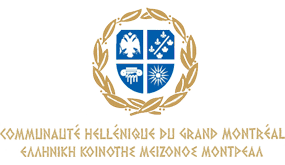HSSQ—Empowerment services to natural caregivers of the elderly (Part II)
 by Eleni Fakotakis-Kolaitis
by Eleni Fakotakis-Kolaitis
Director of HSSQ
We offer individual consultation, information and support to caregivers of the elderly who live in Laval. Our intervention counselors have received intensive training on the subject of Alzheimer disease. We continue to sensitise the Greek community to the needs of natural caregivers of the elderly. We do this through the media, conferences and pamphlet distribution. Our goal is to reach as many natural caregivers who are helping a loved one afflicted with Alzheimer’s or Parkinson’s (etc) as we can before they burn out.
The client of SSHQ is important. They have to feel welcome, they must be treated with respect and they must be involved in their personalised intervention that we will provide. We have to do our best to empower them, so they can maintain their dignity while going through all of their life changes and so their quality of life is always up to par. We have to help them address their psychosocial needs. Our priority is to empower the caregiver with knowledge and skills in order to improve his or her approach and interaction with their loved one.
The caregiver has a variety of support services to participate in that are offered during the day, evening, or weekends in order to facilitate the caregiver’s schedule. These activities range from follow up calls, individual consultation and active listening, support groups, monthly thematic workshops, conferences, information on public and private home-care services, respite care.
The conferences on Elderly Mistreatment Prevention, Parkinson’s, Alzheimer’s, Stress Management, Grief Management, Demystification of Mental Health, Mandates Of Incapacity, When Placement Should Be Considered and the Different Types Of Residences, How To Prevent Falls, How To Encourage Your Loved One To Eat Nutritious Snacks, to name a few, were attended with record numbers of caregivers. During the year, we also offered support groups in either English or Greek, where professionals (male and female) sons and daughter caregivers of elderly attended, in addition to primarily Greek speaking spouses of ill elderly who were being taken care of. In both type of groups, the results were very good, participants were quite satisfied and reported more reassurance in their roles as family member caregivers by the end of the six-week program.
SOME STATISTICS
We estimate that there are approximately 7000 natural Greek caregivers in Laval that should be reached. Our natural caregiver, active, client dossiers have tripled since we started the program (approx.. 150 dossiers).
35% of these caregivers are spouses, 53% are sons or daughters, 3% are grandchildren, 2% are brothers or sisters, 1% are close friends and 6% have another relation with the elderly that they are helping. While we have documented about 201 caregivers who have called or visited us in the last year, to whom we have offered about 326 hours of in-office consultation and psycho-social support. It is also important to note that a small number of our caregiver clients are from outside Quebec. Such as in other provinces, the States or in Greece.
We ran four support groups of approximately 9 caregivers in each, very successfully, guided by our intervention counselors and a variety of invited professionals depending on the topic. Two of these support groups were held in Greek (frequented mostly by spouses) and two in English (frequented mostly by daughters or sons). We also observed that the average age of women in our spouse-support groups is 70, while for men it is 81 years of age.
The majority of the elderly who are being helped by our natural caregiver clients have Alzheimer’s, Parkinson’s or Down’s syndrome. 45% have serious mobility issues, muscular dystrophies, schizophrenia, stroke, depression, blindness, and cancer or require regular kidney dialysis treatment.
Many inform us that the public system is simply not helping their situation, there is an absence of necessary home care support. More sensitization, promotion and respite care in the form of a day center for the elderly is an absolute necessity in the community as there are waiting lists to get respite assessment and for respite services, also, because of language and cultural barriers, many of our caregiver clients or their elderly loved one, have not been helped and the referrals bounce back to us. The evaluations that are filled by participants after each activity, illustrate a high satisfaction for the content, our employees and animators.
An interesting note to make at this point is that there are approx. 37% male caregivers who participate at our activities.
We are funded by APPUI LAVAL. Our budget for this program is $40,000. however, at least double that amount is required to meet the caregiver needs of our community.
CLIENT REMARKS REGARDING OUR PROGRAM
’The workshops have made me a better caregiver!’’
‘’The support groups helped me deal with each one of my problems with patience,
perseverance and new skills that I learned.’’
‘’I really appreciated the activities and I also made friends!’’
‘’I take better care of myself, I take the time that I need, without feeling guilty, nor judged!’’
‘’The program added positive influences in my life!’’
‘’The themes of the discussions are pertinent to my situation.’’
‘’I now have a better understanding of the public and community resources
available to me.’’
‘’I have learned new skills, thanks to the training and the attentive and knowledgeable
instructor.’’
‘’Thank you for all your help, I no longer feel that I am dealing with this alone!’’
‘’My physical health has greatly improved because of your program!’’
HOW WE REACH OUR CAREGIVER CLIENTS
By mail, telephone, announcements in the local media, through other HCGM services, Hellenic Medical Association of Qc, the CLSCs, word-of-mouth




